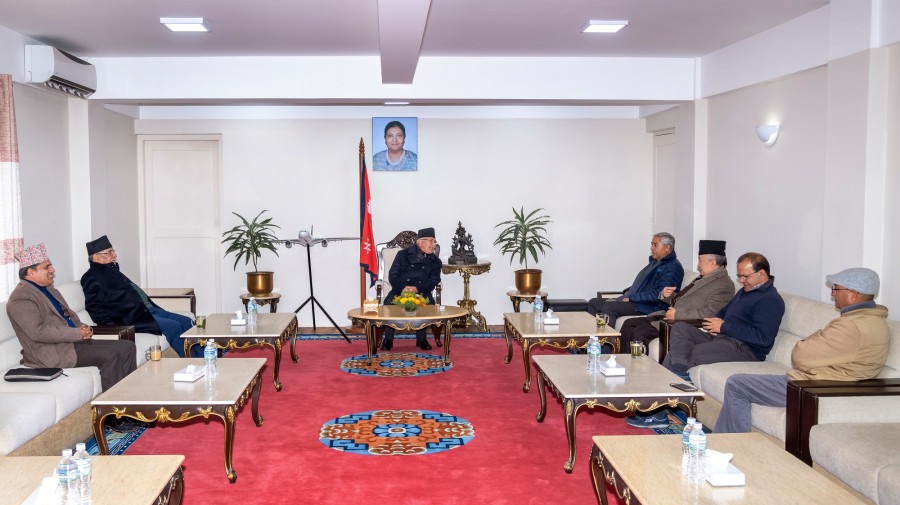National
Conflict victims condemn parties for bulldozing decision on transitional justice appointments
After an agreement between ruling and opposition forces, recommendation committee picks 10 individuals, all with affiliation to political parties.
Binod Ghimire
The ruling and opposition parties on Saturday did exactly what conflict victims, human rights defenders and the international community had been warning against.
The top leadership of the Nepal Communist Party (NCP) and the Nepali Congress on Saturday morning reached an agreement on appointing officials to the two transitional justice commissions. A recommendation committee formed to choose officials swiftly announced 10 names—two chairs and four members each.
Conflict victims, who had been demanding wider consultations and transparency in the appointment process, said they will not accept the new leadership handpicked by the parties.
“The recommendation committee acted at the behest of the parties; its independence has come into question,” Bhagiram Chaudhari, chairman of the Conflict Victims Common Platform, told the Post. “We are not going to accept this leadership.”
The Truth and Reconciliation Commission and the Commission of Investigation on Enforced Disappeared Persons have been without officials since mid-April.
The officials were relieved of their duties after they failed to make effective progress in investigating war-era cases.
Nepal’s transitional justice process has been dragging on for over a decade now, largely due to political parties’ unwillingness to conclude it. Despite promises, parties and the subsequent governments have done precious little—even the Enforced Disappearance Enquiry and Truth and Reconciliation Act-2014 is yet to be amended in line with the 2015 Supreme Court ruling and international obligations.
Since the formation of the recommendation committee led by former chief justice Om Prakash Mishra, conflict victims, rights defenders and the international community had constantly cautioned Nepali politicians to ensure wider consultations while appointing the officials and amending the Act.
The chairs and members of the commissions recommended by the Mishra-led committee are from among the applicants. But all of them have affiliations or close relations with either leaders or the parties, conflict victims say.
Of the 57 applicants, the recommendation committee said it found 54 of them eligible. It had added seven more names on its own and published a list of 61 candidates.
A proposal to add new members was presented by Ramnath Mainali, Sharmila Karki and Prem Bahadur Khadka, who represent then CPN (Maoist Centre), CPN-UML and the Nepali Congress, respectively, to the committee.
The committee on Saturday recommended Ganesh Datta Bhatta, an associate professor at Nepal Law Campus, as the chairperson of the truth commission. Bhatta, who teaches constitutional law, is close to the Nepali Congress. The parties had reached an agreement on Bhatta’s name on November 14 as per Congress President Sher Bahadur Deuba’s request.
Since the truth commission leadership went to Congress quota, the Nepal Communist Party wanted its own “man” in the disappearance commission.
According to Ramnath Mainali, a member of the recommendation committee, Yubraj Subedi, a former joint attorney, has been recommended to lead the disappearance commission.
Subedi is considered to have close relations with Subas Nembang, deputy Parliamentary Party leader of the ruling party.
Advocates Prachand Man Shrestha and Bishnu Pokharel, along with Mana Dahal, a former government employee, and Govinda Gautam have been recommended as members of the truth commission. While Shrestha is from the Nepali Congress quota, the rest are considered close to the ruling communist party.
Bishnu Bhandari, Sunil Ranjan Singh, Gangadhar Adhikari and Sarita Thapa, all practising lawyers, have been recommended as members of the disappearance commission. While Bhandari is the ruling party’s choice, others are from the Congress quota.
“We have submitted the list to Health Minister Bhanu Bhakta Dahal, who is also looking after the Law Ministry at present,” Mainali told the Post. “They will assume office once the Cabinet endorses the names, most probably on Monday.”
Bhatta and Adhikari had not filed applications, but their names were included in the list of probable candidates by the committee members.
Conflict victims say despite commitments by the government, at home and abroad, it failed to heed their voice. Last week, victims had described the government-organised consultations to amend the transitional justice Act as farce.
International human rights organisations, including the Human Rights Watch and the Amnesty International, had repeatedly urged Nepal government to amend the Act before making appointments to the commissions. They had also asked the government and political parties to maintain transparency in the appointment process with constructive participation of conflict victims.
Just last week, Human Rights Watch in its annual report said Nepal failed to ensure justice for war-era abuses. “The current government, like its predecessors, continued to resist amending the transitional justice legislation to abide by a landmark 2015 Supreme Court ruling, which struck down key components of the current law, such as provisions that would allow amnesties even for perpetrators of war crimes and crimes against humanity,” the rights body said.
According to conflict victims, the government and parties have refused to take any advice from the international community.
“How can those appointed at the party leaders’ order investigate the cases against them?” Gopal Shah, chairman of the Conflict Victims National Network, asked.
The two commissions have received complaints against Nepal Communist Party Co-chair Pushpa Kamal Dahal, who was the supreme commander of the People’s War, and Nepal Congress President Sher Bahadur Deuba, under whose prime ministership an emergency was imposed in the country. The highest number of enforced disappearances is reported from his tenure.
“Saturday’s recommendation shows that the government and parties are least bothered about victims’ and human rights community’s concerns,” Raju Chapagain, a human rights lawyer who is associated with Amnesty International Nepal, told the Post. “This can have severe consequences.”




 13.12°C Kathmandu
13.12°C Kathmandu














